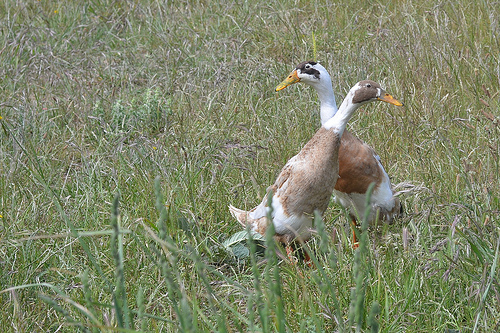Duck, Duck, GOOSE! Raising Waterfowl
 Whether you want eggs, meat, a friendly face, or a guardian animal, ducks and geese are a great choice if you want to think beyond chickens. These personable, active birds are a fantastic addition to the menagerie, and they come in a wide variety of breeds! Check out the Runner Duck (above), for example, with its adorable upright walking gait, or the gentle pied Twente Landrace goose from the Netherlands. Once your flock settles in and you get to know the individual personalities of your feathered friends, you'll never look at ducks and geese the same way.
Whether you want eggs, meat, a friendly face, or a guardian animal, ducks and geese are a great choice if you want to think beyond chickens. These personable, active birds are a fantastic addition to the menagerie, and they come in a wide variety of breeds! Check out the Runner Duck (above), for example, with its adorable upright walking gait, or the gentle pied Twente Landrace goose from the Netherlands. Once your flock settles in and you get to know the individual personalities of your feathered friends, you'll never look at ducks and geese the same way.
Here's the great thing about ducks and geese: both are big foragers, and they love insects, slugs, snails, and other pests along with weeds. They'll happily root around to eliminate garden pests, providing a natural and free form of pest control -- and that means you don't need to feed them very much (if at all, depending on their range). They love weeds, and they're especially great at keeping ponds clear.
In addition, they both provide a source of nutritious, protein-rich eggs. Duck and goose eggs are larger than those of chickens, and perform extremely well in cooking, especially in baking. Furthermore, people who are allergic to chicken eggs can often eat eggs from ducks and geese. And, of course, ducks and geese are walking, waddling, and swimming sources of meat, too, for those who are interested in doing their own butchering. Both offer dark, flavorful, rich meat that's especially popular for holidays.
And about that guard animal thing: some goose breeds are infamous for being aggressive and territorial. That's not so great when they're attacking you, but it's fantastic if you want some property protection and an early warning system. A guard goose can patrol your property to deter unwanted visitors of all species, and geese can also help to protect flocks of chickens and other vulnerable birds. If your guard goose gets too aggressive, I hear roast goose with orange sauce tastes great.
If you plan on starting with babies, you need to know that waterfowl, well, like water. They need a source of fresh clean water at all times, because they love playing and splashing around. Through their infancy and into adulthood, you need to make sure your pals have ample fresh water.
When raising ducklings and goslings, consider using a plastic tote as a brooder box for easy cleanup. Want to make your life easier? Maintain two, so you have a clean one at all times to transfer the babies into while you clear out their befouled nest. If you elevate the floor in your brooder box, the water can drain easily; that way it won't accumulate in the bedding and make a mess. Keep your water in a dish with a block to discourage excessive play, and add feed in the opposite end of the box, with a little brewer's yeast for extra nutrition. Install a sealed pet heater safe for use in damp environments to keep them toasty.
As the birds feather out, you can move them into a protected outdoor enclosure, and when they start to reach adolescence, you can integrate them with the flock. If this is your first flock, your babies can be the first of many garden weeders, pond splashers, and treat cadgers.
You'll want a fence around four feet tall (six for light geese, who could fly over a lower fence) along with a secure shelter to lock everyone in at night. Hire a professional fencing contractor for the job if you're not feeling confident: it needs to be snug and tight! The shelter also needs a water supply and comfortable bedding, so make sure your shelter design is close to a water source and easy to clean. The birds will also need roosts and nest boxes to cozy up in at night.
For comfort and cleanliness, your birds need a water source they can dip their heads into to clean their beaks and nostrils. A trough with an automatic waterer can work well for this, but do yourself a favor and keep it away from food dishes or mud-prone areas! In terms of food, a small amount of rations in the evening or morning can be enough (you want to encourage your avian pest and weed controllers to do their jobs), but in spring, add a little more to the dish to encourage egg laying.
Even if you're keeping geese and ducks with no ganders or drakes, sometimes females go broody. They'll hunker down on an egg and decide to sit there until it hatches, come what may. There are several options for dealing with a broody animal including putting fertile eggs under her, repeatedly shifting her off the nest, or putting her in a cage for a few days so she can't nest. Make sure broody animals have access to food and water, because they will die on the nest rather than abandon their eggs!
Not many veterinarians treat ducks and geese, but if there is a problem with your flock, you may have some options. Common problems like mites can be treated with powders available at your feed store, and animal antibiotics are also available for cuts and scrapes. If one of your flock breaks a leg or wing, contact a vet to talk about your options and see if it's possible to set the limb. An animal too injured to live comfortably can be humanely slaughtered, but if that would be difficult for you, a veterinarian may be able to offer euthanasia.
Want some ducks and geese of your own? Your feed store will have goslings and ducklings around this time of year, or you can order from a company like Murray McMurray or Meyer Hatchery.
Katie Marks writes for Networx.com.
Updated November 21, 2018.
Looking for a Pro? Call us (866) 441-6648

Landscaping Average Costs
Landscapers Experiences

Contracted A Large Tree Trimming Job For A Reasonable Price

Rotted Fence Repair Taken Care Of Fast And Efficiently



